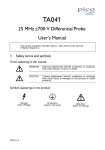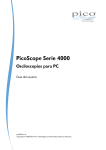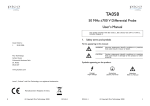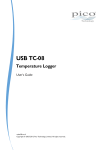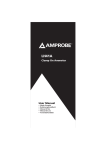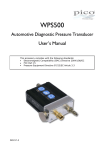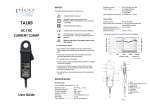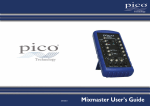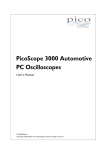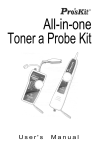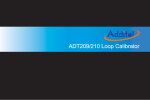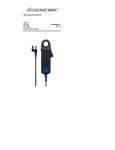Download TA167 2000 A Current Clamp User`s Guide
Transcript
SAFETY The following symbols appear on the product: Attention! Refer to Manual. TA167 Application around and removal from UNINSULATED HAZARDOUS LIVE conductors is permitted. Double/Reinforced Insulation. AC / DC CURRENT PROBE Complies with the relevant European standards. Do not dispose of this product as unsorted municipal waste. Contact a qualified recycler for disposal. Frequency range ............... DC to 20 kHz (-1 dB) .......................................... IRMS x f ≤ 400,000 Power supply ..................... 9 V Alkaline battery PP3, MN 1604 or IEC6LR61 Load impedance (minimum) > 100 kΩ and ≤ 100 pF General data Conductor size ................... 32 mm diameter Output cable and connectors 2 m long coax terminated with safety BNC connector Operating temperature ....... 0°C to +50°C Storage temperature with Battery removed................. -20°C to +85°C 1) Accuracy quoted is for conductor in centre of aperture Read all instructions completely before using this product. 1 To avoid electric shock: 2 • Use caution during installation and use of this product; high voltages and currents may be present in circuit under test. • This product must be used only by qualified personnel practising applicable safety precautions. 3 4 4 6 • Do not use product if damaged. • Always connect probe to display device before it is installed around the conductor. • Always ensure the probe is removed from any live electrical circuit, and leads are disconnected before removing the battery cover. 7 8 9 • Do not hold the probe anywhere beyond the tactile barrier see Fig 1. SPECIFICATION Electrical data Fig 1 (All accuracies stated at 23°C ± 1°C) User Manual Nominal current ................. Measuring range (s) ........... Overload capacity .............. Output sensitivity ................ Accuracy1) (0 – 200/1500 A) Accuracy1) (1500 – 2000 A) Resolution .......................... Gain variation ..................... 2000 A ACPEAK or DC 2000 A 2200 A (60 s) 10 / 1 mV/A ± 1% of reading ± 100 / ± 500 mA ± 5% of reading ± 100 / ± 500 mA ±0.15% of reading/°C 1. 2. 3. 4. 5. 6. 7. 8. 9. Jaws Conventional current direction Tactile Barrier Battery cover Battery cover screw Jaw trigger ON/OFF and Range switch Auto zero button LED 5 OPERATING INSTRUCTIONS Switch On Unclamp the probe from the conductor, turn it off using the On Off switch and disconnect the output leads, from external equipment. When the probe is switched on to the required measuring range, the green LED will illuminate. The LED starts flashing when the battery voltage is too low for normal operation and warns the user that it requires changing. This procedure is described below. Loosen the captive screw which secures the battery cover. Lift the cover through 30° and pull it clear of the probe body as shown in Fig 1. Replace the battery and re-fit the battery cover and fasten the screw. Auto Zero SAFETY STANDARDS The output zero offset voltage of the probe may change due to thermal shifts and other environmental conditions. Select the required measuring range and to null the output voltage depress the Auto Zero button. Ensure that the probe is away from the current carrying conductor whilst the probe is being nulled. Current Measurement 1. Switch on the probe by selecting the required measuring range and check that the green LED is lit. 2. Connect the output lead to the oscilloscope, 3. Zero the probe using the Auto Zero button. 4. Clamp the jaws of the probe round the conductor ensuring a good contact between the closing faces of the jaws. 5. Observe and take measurements as required. Positive output indicates that the current flow is in the direction shown by the arrow on the probe. Auto Power OFF In order to save battery life, the probe will automatically switch itself off after approximately 10 minutes. To disable the Auto power off function, Switch Off the probe and Switch On whilst pressing the auto zero button. The red LED will illuminate and the probe will stay ON until switched off again. Battery Replacement The green or red LED will flash when the minimum operating voltage is approached. Refer to Fig 1. Use the following procedure: SAFETY WARNING Before removing the battery cover, ensure that the probe is disconnected from the oscilloscope and remote from any live electrical circuit. Fit only Type 9 V PP3 Alkaline (MN 1604). EN 61010-1:2001 EN 61010-2-032:2002 EN 61010-031:2002 300V Cat III, Pollution Degree 2 EMC Standards EN 61326-2-2:2006 ROHS and WEEE compliant WARRANTY Your current probe is guaranteed for one year from the date of purchase against defective material or workmanship. If the probe fails during the warranty period, we shall at our discretion, repair or replace it with a new or reconditioned unit provided we are satisfied that the failure is due to defective material or workmanship. To make a claim under warranty, the probe should be returned to us, postage prepaid, with a description of the defect. The use of a battery, other than that specified invalidates this warranty. Goods alleged by the buyer to be defective shall not form the subject of any claim for injury, loss, damage, or any expense howsoever incurred, whether arising directly or indirectly from such alleged defects other than death or personal injury resulting from the seller‘s negligence. No condition is made or to be implied, nor is any warranty given or to be implied as to the life or wear of goods supplied or that they will be suitable for any particular purpose or for use under specific conditions, notwithstanding that such purpose or conditions may be made known to the seller. This product is designed to be safe under the following conditions: - indoor use - altitude up to 2000 m - temperature 0°C to +50°C - maximum relative humidity 80% for temperatures up to 31°C decreasing linearly to 40% relative humidity at 50°C. Use of the probe on uninsulated conductors is limited to 300 V ACRMS or DC. and frequencies below 1 kHz. Safety in its use is the responsibility of the operator who must be a suitably qualified or authorised person. Ensure that your fingers are behind the protective barrier see Fig 1 when using the probe. Always inspect the probe and lead for damage before use. To avoid electric shock, keep the probe clean and free of surface contamination. Use a cloth moistened with Isopropyl alcohol to clean the probe, ensure the probe is completely dry before using. Pico Technology Limited James House Colmworth Business Park St Neots Cambridgeshire PE19 8YP United Kingdom Tel: +44 (0) 1480 396395 Fax: +44 (0) 1480 396296 Technical Support: [email protected]


